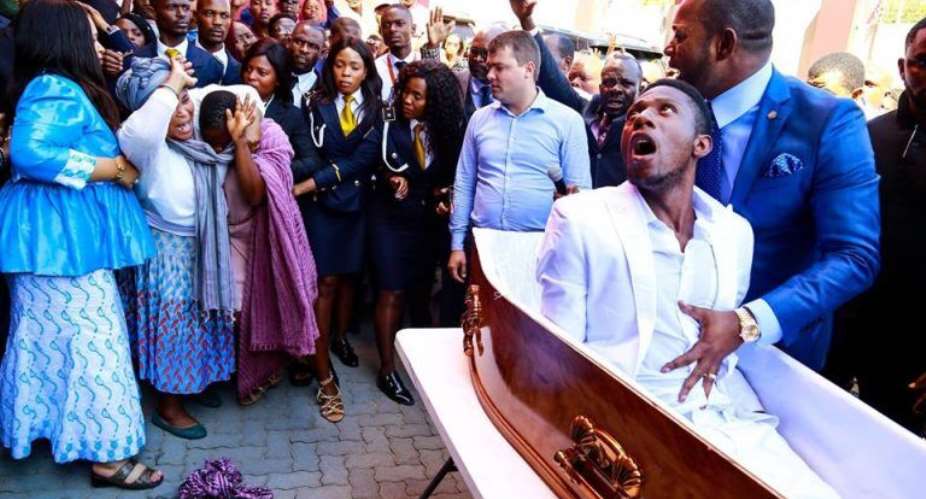In many parts of the world, self-proclaimed miracle-working pastors command vast congregations and generate substantial revenue. These alleged men of God claim to heal the sick, predict the future, and bring prosperity to their followers. However, mounting evidence suggests that many are little more than skilled con artists. The recent public dispute between Pastor Ogyaba and Avram Ben Moshe over the authenticity of Ogyaba's miracles has brought this issue to the forefront.I am not by this taking sides.
Consider the 2018 case of Madam Ama Bissiw from Asamankoma. Summoned by the Offinso Traditional Authority, she confessed to colluding with various pastors to defraud unsuspecting congregants. Bissiw admitted to training 100 others in the art of staging healing scams across the country. This lucrative enterprise exploits the enduring power of religion as "the opium of the masses," a concept coined by Karl Marx in 1844.
Miracles are fundamental to creating and reinforcing faith. Where miracles fail, faith often falters. Even biblical figures like Moses performed miracles to validate their divine calling, as recorded in Exodus 4:29-31. Human nature remains largely unchanged, and the same principles apply today.
Recognizing this reality, many preachers, faith healers, and spiritualists go to great lengths to stage miracles. Once successful, they boost their congregation's faith, making followers more vulnerable to manipulation and less likely to question authority. A reputation for miracle-working allows these individuals to exploit and control their flock with ease.A sure Highway to financial independence.
In developing countries like Ghana, where afflictions abound and conventional solutions often fall short, churches become a last resort for many. Unscrupulous pastors capitalize on this desperation, promising miraculous cures but failing to deliver. These charlatans avoid hospitals, where medical professionals could scrutinize their claims. Instead, they create controlled environments within their churches, manipulating outcomes and testimonies.The lockdown period during Covid 19 really lifted a veil off these fake men of God.
This problem extends far beyond Ghana's borders. Globally, several high-profile pastors have been exposed for fraudulent practices. Televangelist Benny Hinn, who has amassed a fortune through his purported healing crusades, serves as a prominent example. Investigative reports and insider accounts have revealed the orchestrated nature of many of Hinn's miracles.
For instance ,in 2001 NBC investigation uncovered that many people who claimed healing at Hinn's crusades later found their illnesses persisted or worsened. The investigation also revealed that Hinn's ministry strictly controlled who could testify on stage, often showcasing only those with less verifiable ailments.
The reluctance to perform miracles in hospitals is a deep revealing sign of fraudulent pastors. Hospitals provide an environment where medical evidence and professional scrutiny can easily expose false claims. Church settings, however, allow these individuals to control the narrative through staged testimonies and suggestive rhetoric.
These pastors employ several tactics to maintain their facade
First of all a controlled environments. Churches provide highly charged emotional atmospheres conducive to placebo effects and psychological manipulation.
There are also selective testimonies. Pastors choose who testifies about healing, often selecting individuals with conditions that are not immediately verifiable.
Lastly is the avoidance of scrutiny.As hospitals allow medical professionals to evaluate healing claims, making it harder for pastors to fake miracles.
The impact on the Christian community has been profoundly negative. Beyond lost faith, followers often face financial ruin after spending significant sums on donations in hopes of miracles that never materialize. This financial burden, combined with false hope and eventual disillusionment, leads to severe emotional and economic distress.
In extreme cases, individuals forgo medical treatment entirely, relying solely on a pastor's promises. This can result in worsening health or even death. The broader community suffers as well, with trust in genuine religious and medical institutions eroding.
To address this issue, we must take steps to raise awareness about the tactics used by fake pastors to empower individuals to make more informed decisions.We must encourage government collaboration with religious bodies to create regulations protecting vulnerable individuals from exploitation.Also we must provide support for victims to help them recover financially and emotionally.
In conclusion, if these miracle-working pastors truly possess divine healing powers, they must demonstrate them in hospitals. This would not only alleviate pressure on our healthcare system but also bolster the faith of more people and increase their following. It is the surest way to silence critics and reinforce the faith of doubting Christians. The time has come to bring miracles from the church to the hospital - for God's sake and for the sake of those in genuine need of healing.
Long Live Mother Ghana
Dumenu Charles Selorm





 You're an illiterate, illogical; a sane person won't praise Bawumia's 'destructi...
You're an illiterate, illogical; a sane person won't praise Bawumia's 'destructi...
 NHIS was a brainchild of NDC, piloted during PNDC era; we've failed to market th...
NHIS was a brainchild of NDC, piloted during PNDC era; we've failed to market th...
 'Mahama has no respect for Ghanaians; I'm disappointed in him' — Development Eco...
'Mahama has no respect for Ghanaians; I'm disappointed in him' — Development Eco...
 King Oyanka petitions IGP: Greater Accra Regional Police accused of undermining ...
King Oyanka petitions IGP: Greater Accra Regional Police accused of undermining ...
 'It's backed by data' — Local gov't Minister clarifies his 'Ghana's poverty leve...
'It's backed by data' — Local gov't Minister clarifies his 'Ghana's poverty leve...
 TUC condemns manager for assaulting female employee at Nkawkaw over GHC90
TUC condemns manager for assaulting female employee at Nkawkaw over GHC90
 SSNIT Hotels Sale: We will continue to engage stakeholders — Director-General
SSNIT Hotels Sale: We will continue to engage stakeholders — Director-General
 Claims gov't secured debt restructuring agreement with IPPs misleading, deceptiv...
Claims gov't secured debt restructuring agreement with IPPs misleading, deceptiv...
 Koforidua SECTECH Staff dies in car crash at Somanya
Koforidua SECTECH Staff dies in car crash at Somanya
 NDC National Executive fume over suspension of ‘sexy’ Assin Central PC
NDC National Executive fume over suspension of ‘sexy’ Assin Central PC
